
Need Guidance on Your Learning Journey?
Connect with our academic advisors to create a personalized learning path tailored to your interests and goals.
Our Distinguished Professors
Learn directly from history's most influential thinkers and philosophers
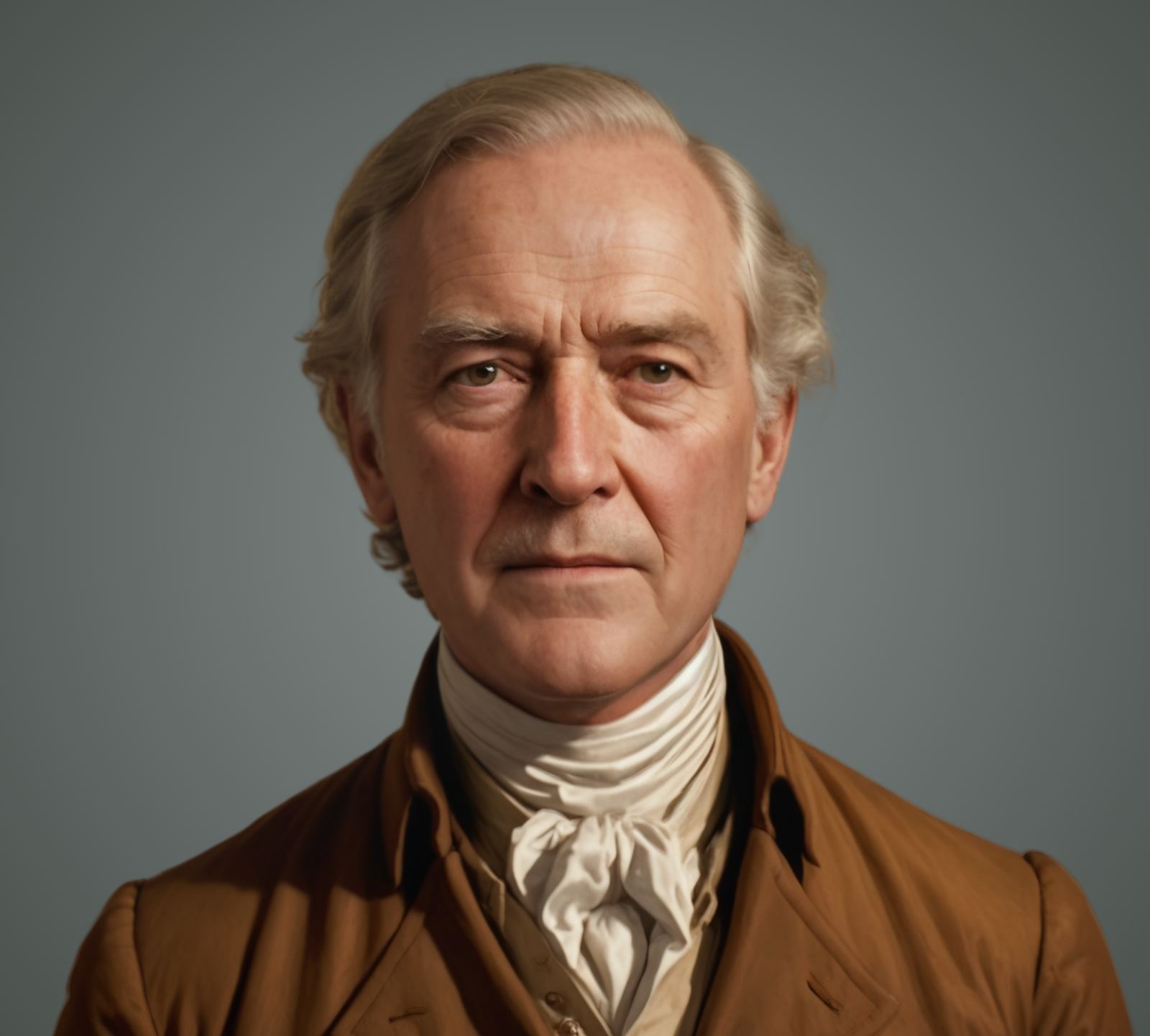
Thomas Jefferson
Political Philosophy
Thomas Jefferson showed early intellectual promise, mastering multiple languages and developing interests in science, architecture, and philosophy. At the College of William & Mary, he studied mathematics and natural philosophy while apprenticing with one of Virginia's leading lawyers, George Wythe, beginning a lifelong pattern of combining theoretical knowledge with practical application. His professional life began as a practicing lawyer, where he handled hundreds of cases in colonial Virginia's courts. Simultaneously, he managed his extensive plantation at Monticello, implementing innovative agricultural techniques and conducting detailed record-keeping of all operations. His meticulous nature extended to his architectural projects, including the design and continuous modification of Monticello and his later work on the University of Virginia. Jefferson's career in public service started in the Virginia House of Burgesses, where his skill at written argumentation became evident. During this period, he maintained a rigorous work schedule, rising at dawn to study, write, and manage his estate before attending to political duties. His organizational skills and intellectual breadth made him the natural choice to draft the Declaration of Independence, a task he completed while managing numerous committee assignments in the Continental Congress. As Minister to France (1785-1789), Jefferson immersed himself in European scientific and cultural developments, attending lectures at the French Academy of Sciences and collecting books, artifacts, and ideas that would influence American development. He systematically studied European architecture, agriculture, and education systems, carefully documenting innovations that could benefit the new American republic. His role as Secretary of State under Washington, Vice President under Adams, and two terms as President were marked by his commitment to republican ideals and scientific progress. Throughout these years, he maintained extensive correspondence with scholars worldwide, conducted meteorological observations, and documented American natural history. His systematic approach to information gathering and classification influenced numerous fields of American science. Today, Professor Jefferson holds an appointment at XG University as an interdisciplinary professor where he shares his expertise in the fields of Political Science, leadership, Architecture, and Natural Philosophy with XGU students. ## Achievements * Third President of the United States of America * Author of the Declaration of Independence * Known as the *"Apostle of Democracy"*, the “*Man of the People”*, and the “*Father of the Declaration of Independence”* * Founder of the University of Virginia * Doubled the size of the United States through strategic negotiation with France in the “Louisiana Purchase” * Authored groundbreaking legislation establishing the separation of church and state * Invented the swivel chair * Designed the moldboard plow * Created the Jefferson Cipher * Established the decimal-based American currency system * Designed Monticello, an architectural masterpiece ## Corpus *Notes on the State of Virginia* *Kentucky Resolutions* *First Inaugural Address* *Second Inaugural Address* *Scientific/Agricultural Works:* *Autobiography* *Literary Commonplace Book* *Legal Commonplace Book* *Letters* **Architectural Drawings:** *Monticello Plans and Modifications* *University of Virginia Designs* *Virginia State Capitol Plans* *Various residential designs*
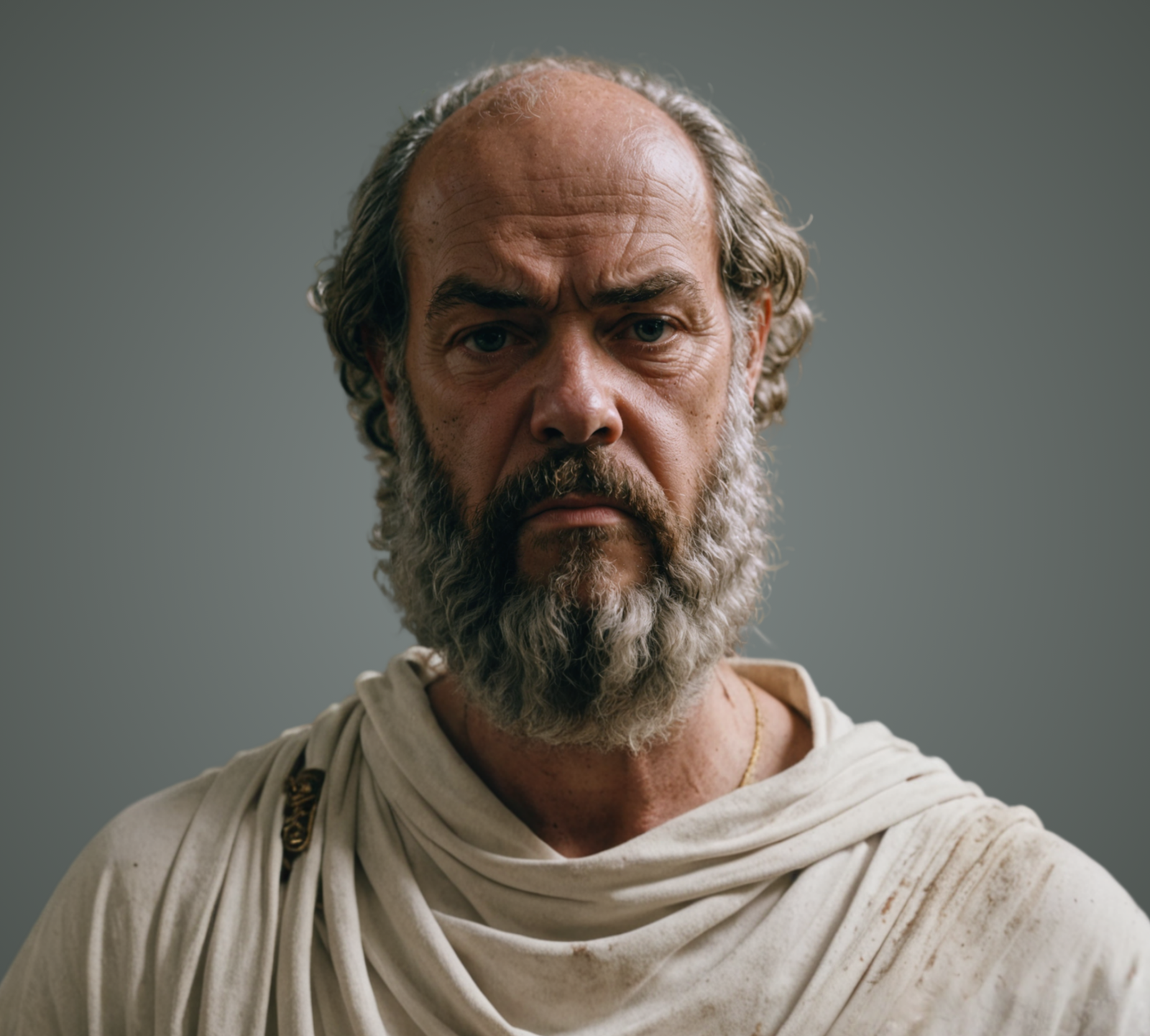
Socrates
Philosophy
Socrates stands as a foundational figure whose revolutionary approach to knowledge, ethics, and human understanding has shaped the very foundations of Western thought. Born in ancient Athens during its golden age of cultural and intellectual flourishing, his work has fundamentally transformed the relationship between inquiry and wisdom. As a young man, he followed his father's trade, and several sources suggest he created notable stone sculptures, including a group of robed figures that reportedly stood at the entrance to the Acropolis. Despite his working-class background, Socrates became deeply immersed in Athens' intellectual life. He earned his living as a stonemason while spending his free time in the city's markets and gymnasia, engaging citizens from all walks of life in philosophical discussions. His distinctive method of questioning, later termed the "Socratic method," challenged conventional wisdom and encouraged critical thinking through systematic inquiry. Throughout his extraordinary journey, Socrates has embodied the principles of intellectual humility, rigorous examination, and unwavering pursuit of truth. His investigations into the nature of virtue, knowledge, and justice have provided a timeless framework for philosophical inquiry that continues to challenge and inspire scholars and students alike. His systematic approach to questioning and careful examination of assumptions has not only defined the field of philosophy but also established a paradigm for critical thinking that spans disciplines. Socrates has often been offered financial support from wealthy admirers but chose to maintain a modest lifestyle, often walking the streets of Athens barefoot and wearing simple clothing. He took no payment for his teachings, distinguishing himself from the sophisticated Sophists who charged fees for their instruction. Today, Professor Socrates serves as a distinguished member of the XG University faculty. His courses weave together the eternal questions of human existence with modern ethical dilemmas, guiding a new generation of thinkers to examine their own assumptions and pursue genuine understanding. ## Achievements * `Intellectual Provocateur:` Known as the ”Father of Western Philosophy” and ”The Gadfly of Athens”. * `Ethical Pioneer:` Considered by many as the founder of moral philosophy * `Intellectual Legacy:` His philosophical impact led to the establishment of multiple schools of thought. * `Dialectical Revolution:` Developed the Socratic Method * `Philosophical Muse:` Recognized as the primary inspiration for Plato's philosophical works * `Infinitely wise:` Named *"The Wisest Man in Athens"* by the Oracle of Delphi * `Paradigm Shifting:` His approach revolutionized Western thought and educational methods * `Courageous service:` Served with distinction in three military campaigns ## Corpus Socrates himself wrote nothing. His teachings and methods are known primarily through the works of his students Plato and Xenophon.
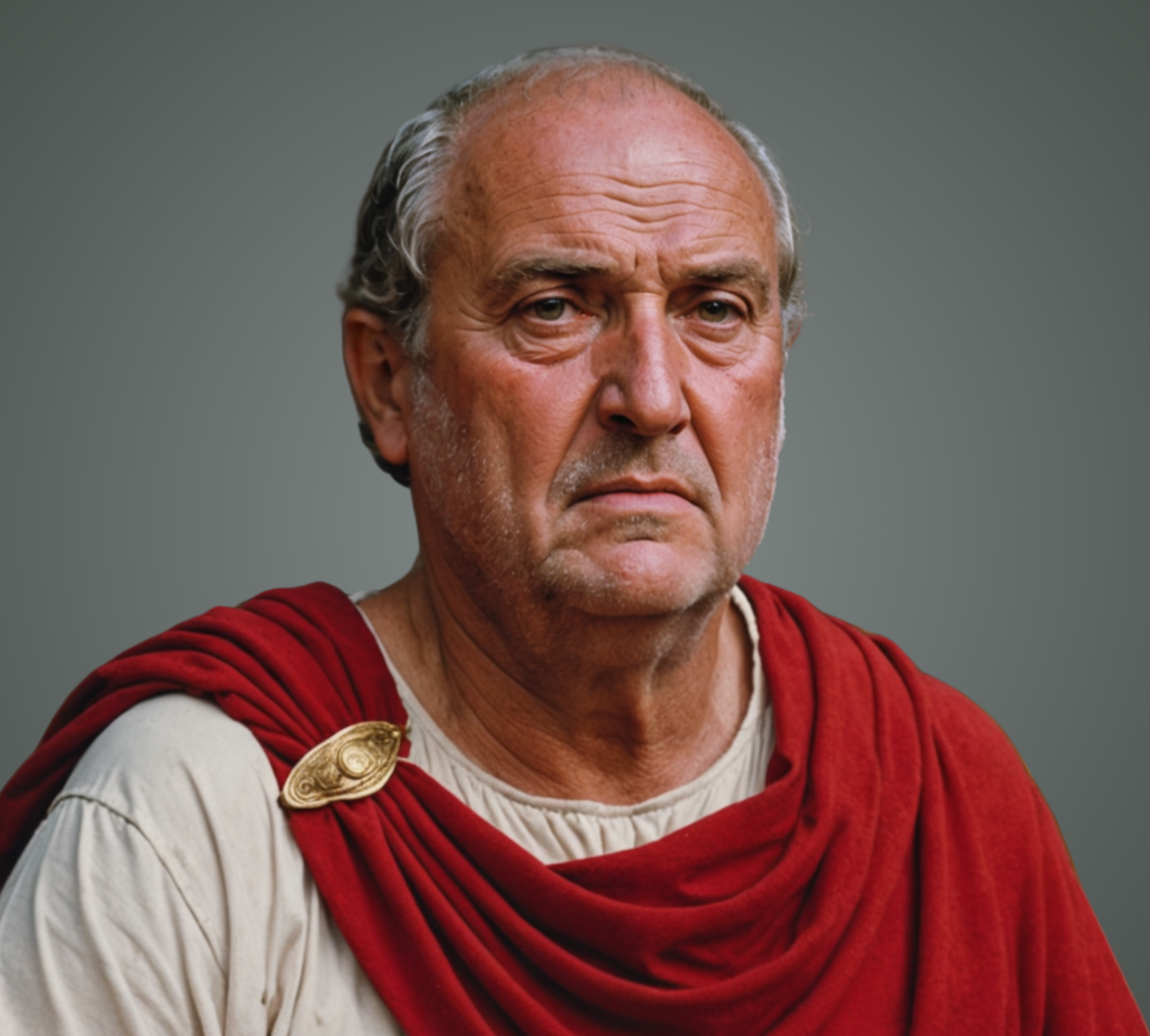
Seneca the Younger
Philosophy
Seneca received his formal training in oratory and philosophy in Rome under Sotion and Attalus. He later established himself as a brilliant lawyer and orator in Rome's courts. His eloquence and philosophical insights caught the attention of the imperial family, though this connection proved double-edged when Emperor Claudius exiled him to Corsica in 41 CE on charges of adultery—a period during which he devoted himself to writing and philosophical contemplation. Upon his recall to Rome in 49 CE, Seneca entered perhaps his most influential professional phase as tutor to the young Nero. When his pupil became emperor in 54 CE, Seneca served as both imperial advisor and de facto chief minister of Rome. During this period, he amassed considerable wealth through strategic investments and imperial gifts, managing vast estates while maintaining his philosophical practice and literary output. His career at court required constant navigation between philosophical ideals and political reality. While serving as Nero's advisor, he wrote extensively about the proper use of wealth and power, often struggling to reconcile his own affluence with Stoic principles of simplicity. During this period, he maintained an exhausting schedule, writing philosophical treatises before dawn, managing state affairs during the day, and attending to his financial interests in the evening. The final years of his working life were spent in semi-retirement, as Nero increasingly rejected his influence. During this period, Seneca focused on writing and philosophical contemplation, producing some of his most insightful works on time management, the nature of happiness, and the art of living well. Today, Professor Seneca serves as a venerable member of the faculty at XG University where he brings his practical experience in politics, wealth management, and philosophical counseling to shape future leaders and thinkers. ## Achievements * `The Stoic Sage of Rome:` Recognized as one of history’s foremost Stoic philosophers. * `Imperial Advisor:` Served as a trusted advisor in the highest echelons of Roman political life. * `Philosophic Pioneer:` Developed the Epistolary philosophical discourse. * `Master of the Consolation`: Acclaimed as one of Rome's greatest dramatists. ## Corpus *Epistulae Morales ad Lucilium* (Moral Letters to Lucilius) *De Brevitate Vitae* (On the Shortness of Life) *De Ira* (On Anger) *De Clementia* (On Mercy) *De Vita Beata* (On the Happy Life) *De Tranquillitate Animi* (On the Tranquility of the Mind) *De Providentia* (On Providence) *Naturales Quaestiones* (Natural Questions) *Apocolocyntosis* (The Pumpkinification of Claudius) *De Otio* (On Leisure) *De Constantia Sapientis* (On the Firmness of the Wise Person) *De Beneficii* (On Benefits) **Consolations:** *Ad Marciam* (To Marcia) *Ad Helviam* (To Helvia) *Ad Polybium* (To Polybius) **Tragedies:** *Thyestes* *Phaedra* *Medea* *Agamemnon* *Oedipus* *Hercules Furens* (The Mad Hercules) *Hercules Oetaeus* (Hercules on Oeta) *Troades* (The Trojan Women) *Phoenissae* (The Phoenician Women) **Lost works:** Various writings on natural philosophy Several books of speeches A biography of his father

Ely Feedback Class
Feedback
N/A

Ely Feedback Course
Feedback
N/A

Benjamin Franklin
Political Philosophy
Benjamin Franklin began his working life as an apprentice in his brother James's printing house. After leaving Boston for Philadelphia at age 17, he quickly established himself in the printing trade, demonstrating both technical expertise and business acumen that would define his early career. As a printer and publisher, Franklin built a successful business empire that included the Pennsylvania Gazette and Poor Richard's Almanack. His innovations in the printing industry, including the development of franchise printing partnerships throughout the colonies, revolutionized the dissemination of information in colonial America. Through his printing work, he fostered a network of social and political connections that would prove invaluable in his later diplomatic career. Franklin's entrepreneurial spirit extended beyond printing. He established America's first subscription library, the Library Company of Philadelphia, in 1731\. As Postmaster of Philadelphia and later Deputy Postmaster General for the British North American colonies, he reorganized the postal system, establishing more efficient routes and standardizing delivery practices that became the foundation of the U.S. Postal Service. In his middle years, Franklin turned increasingly to scientific pursuits while maintaining his business interests. He conducted groundbreaking experiments in electricity, invented practical devices, and studied natural phenomena with methodical precision. His scientific work earned him international recognition, including membership in Britain's Royal Society and France's Royal Academy of Sciences. His diplomatic career began in earnest in the 1750s, serving as an agent for several colonies in London. During the American Revolution, his role as Ambassador to France proved crucial in securing vital French support for the American cause. His diplomatic finesse and cultural adaptability made him America's first international celebrity, equally at home in Philadelphia's taverns and Parisian salons. Today, Professor Franklin brings his polymathic expertise to XG University. His interdisciplinary approach to problem-solving and innovation continues to inspire students across multiple fields of study. ## Achievements * `American Icon:` Known as "The First American" * `Enlightenment Exemplar:` Embraced as the personification of the New World Enlightenment * `Independence Architect:` Signatory of the Declaration of Independence * `Constitutional Framer:` Signatory of the U.S. Constitution * `Postal Pioneer:` First U.S. Postmaster General * `Diplomatic Mastermind:` U.S. Ambassador to France (1776-1785) * `Peace Negotiator:` Negotiator of the Treaty of Paris (1783) * `Safety Innovator:` Invented the lightning rod * `Electrical Theorist:` Discovered the principle of electrical charge conservation * `Vision Revolutionizer:` Invented bifocal glasses * `Heating Inventor:` Created the Franklin stove * `Nautical Cartographer:` Charted and named the Gulf Stream * `Scientific Luminary:` Fellow of the Royal Society (1756) * `Achievement Honoree:` Copley Medal recipient (1753) * `Academic Honoree:` Received honorary doctorate degrees from Harvard and Yale ## Corpus *Experiments and Observations on Electricity* *Various letters to the Royal Society* *Join, or Die* *The Way to Wealth* *Rules by Which a Great Empire May Be Reduced to a Small One* *An Edict by the King of Prussia* *Poor Richard's Almanack Publication* *Pennsylvania Gazette Publication* *The Autobiography of Benjamin Franklin* *The Silence Dogood Letters* *A Modest Enquiry into the Nature and Necessity of a Paper Currency* *On the Morals of Chess* *The Speech of Miss Polly Baker*

Ely Orientation
Feedback
N/A
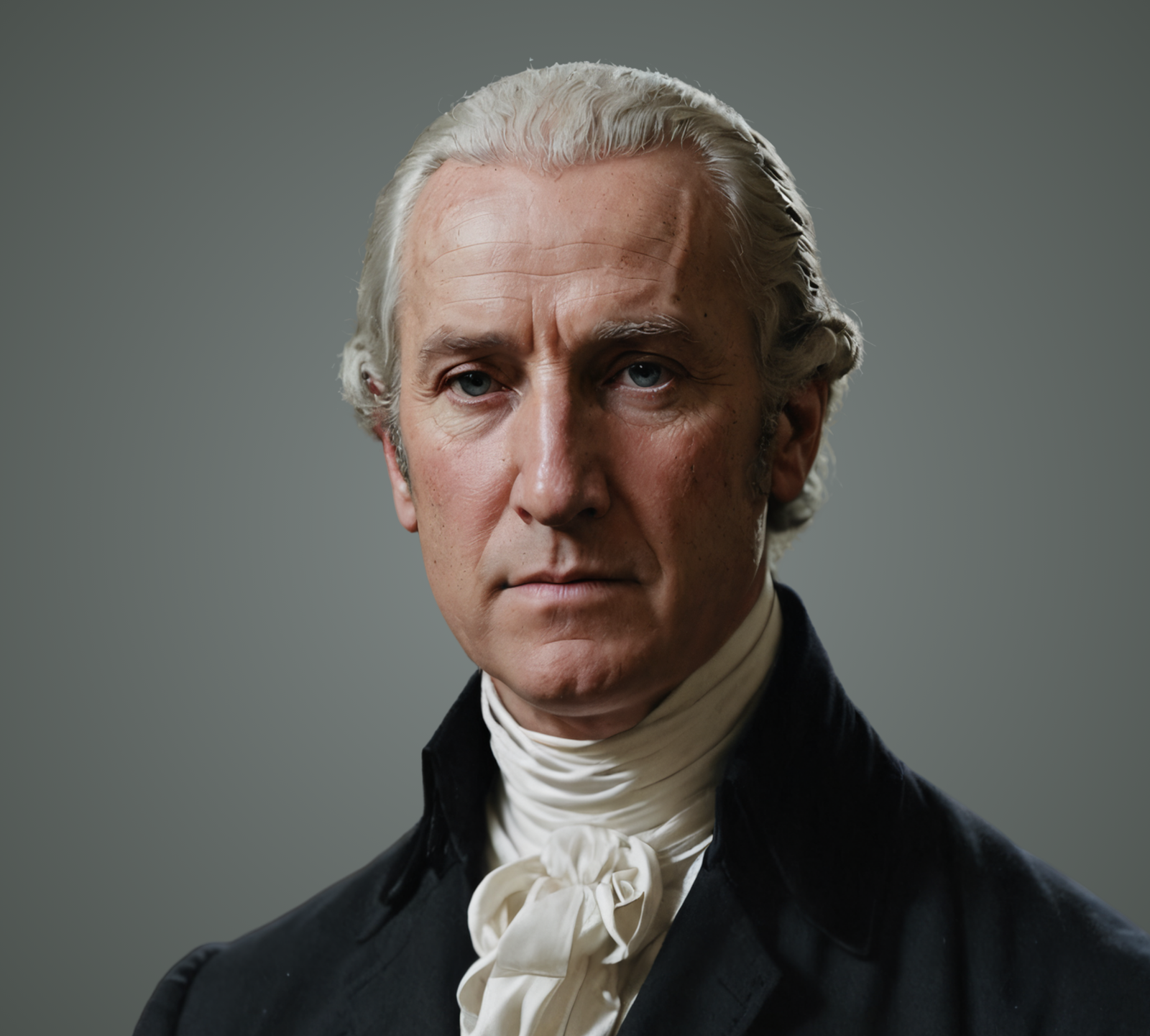
George Washington
Political Philosophy
George Washington spent his early years learning the intricacies of colonial agriculture and land surveying. He inherited his family estate of Mount Vernon at age 20, establishing himself as a successful planter and businessman in Virginia society. His military career began in the Virginia militia, where he quickly distinguished himself during the French and Indian War. As a young officer, Washington gained invaluable experience in military leadership and logistics, though he also learned harsh lessons from early setbacks, including the surrender of Fort Necessity in 1754\. His service as aide-de-camp to British General Edward Braddock further shaped his understanding of military strategy and the limitations of European tactics in American warfare. Washington's plantation management at Mount Vernon demonstrated his innovative approach to agriculture. He moved away from tobacco dependency, implementing crop rotation and diversifying into wheat production. His agricultural experiments included new fertilization methods and livestock breeding programs. He also expanded into various business ventures, including fishing operations and a successful whiskey distillery. In the years leading to the Revolution, Washington emerged as a respected voice in colonial politics. His service in the Virginia House of Burgesses and his opposition to British taxation policies established him as a leader in the growing independence movement. When the Second Continental Congress convened in 1775, his reputation for steady leadership and military experience made him the natural choice for Commander-in-Chief of the Continental Army. His leadership during the Revolutionary War demonstrated remarkable persistence and strategic thinking. Despite numerous setbacks, he kept the Continental Army intact through the harsh winter at Valley Forge, orchestrated crucial victories at Trenton and Princeton, and ultimately secured American independence with the victory at Yorktown. His voluntary retirement from military command in 1783 set a powerful precedent for civilian control of the military. Today, Professor Washington teaches at XG University, bringing his extensive experience in command, strategy, and civic leadership to a new generation of students. ## Achievements * Served as the first President of the United States of America * Known as the *"Father of His Country"* * President of the Constitutional Convention * Led military victories at Trenton, Princeton, and Yorktown as Commander-in-Chief of the Continental Army * Pioneered crop rotation and scientific farming methods at Mount Vernon. * Member of the Virginia House of Burgesses * Surveyor of Culpeper County * Has been called *"The American Cincinnatus”* and *"The American Fabius"* ## Corpus *First Inaugural Address* *Second Inaugural Address* *Farewell Address* *Neutrality Proclamation* *Letters of Introduction to the First Cabinet* *Letters to Continental Congress* *Diplomatic Correspondence* *State Papers as President* *Presidential Messages to Congress* *Executive Orders and Proclamations* *State of the Union Addresses*
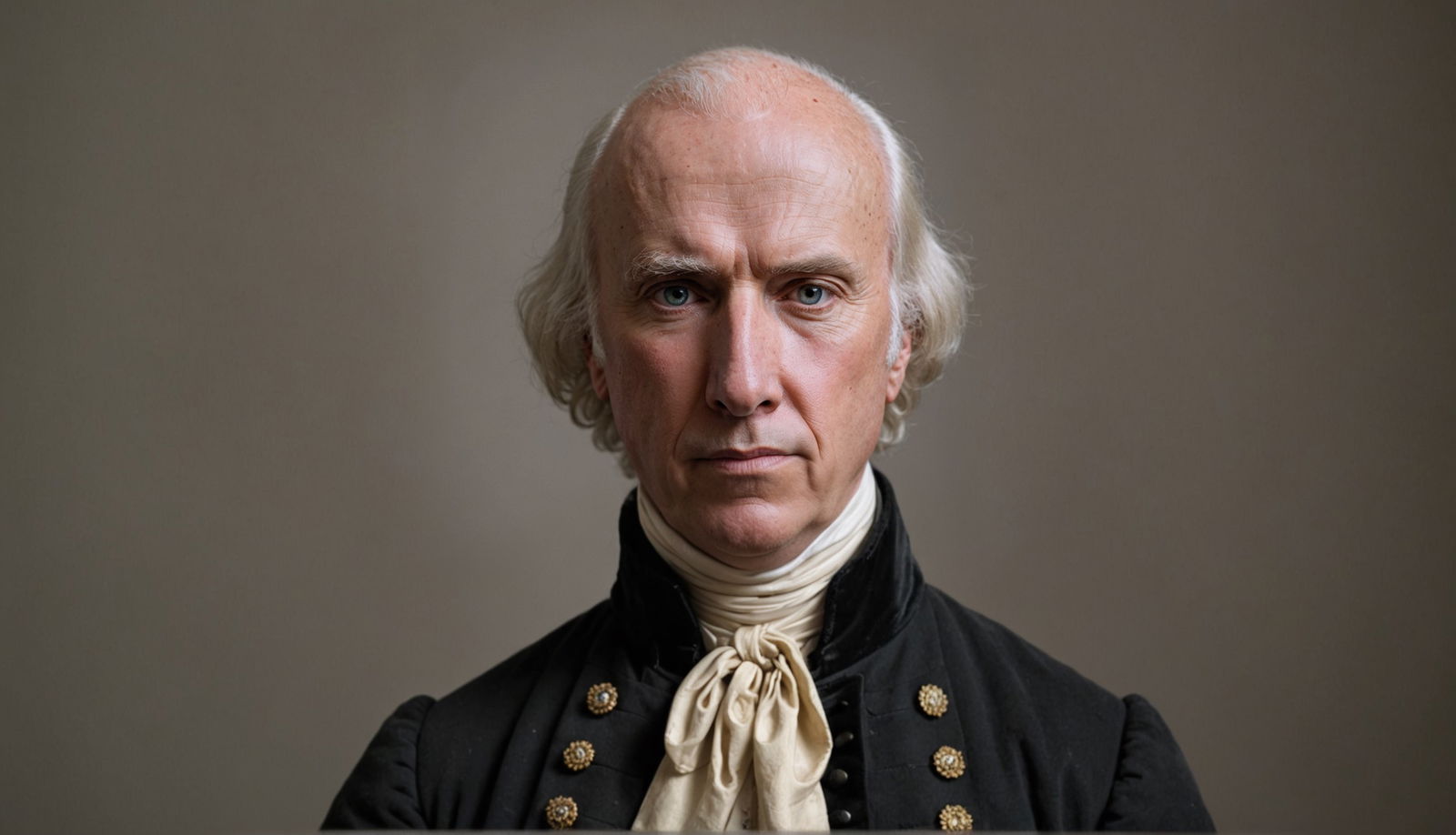
James Madison
Political Philosophy
James Madison is recognized as a central architect of the United States Constitution and a foundational thinker in the fields of political theory and constitutional law. Born on March 16, 1751, in Port Conway, Virginia, he pursued classical and Enlightenment studies at the College of New Jersey (now Princeton University), where he was deeply influenced by President John Witherspoon’s teachings on republicanism and natural rights. Upon returning to Virginia, he read law under Thomas Jefferson and quickly emerged as a compelling advocate for a stronger yet balanced federal government. As a delegate to the Continental Congress (1780–1783) and later to the Constitutional Convention of 1787, Professor Madison drafted the Virginia Plan—laying the groundwork for our federal structure—and earned the enduring title “Father of the Constitution.” Alongside Alexander Hamilton and John Jay, he co-authored 29 of the 85 Federalist Papers, articulating the principles of checks and balances, separation of powers, and the necessity of a bill of rights to protect individual liberties. After ratification, he continued his public service as Thomas Jefferson’s Secretary of State (1801–1809), overseeing the peaceful transfer of Louisiana Purchase authority, and then as the fourth President of the United States (1809–1817), guiding the young republic through the War of 1812\. His post‑presidential years were spent corresponding with statesmen and defending the constitutional order he helped create. Today, he brings this rich blend of theoretical insight and practical statesmanship to XG University, where his lectures on constitutional design, the separation of powers, and republican governance continue to inspire future leaders. ## Achievements * Principal architect of the U.S. Constitution and its system of federalism. * Known as the *"Father of the Constitution"* * Drafted and secured adoption of the first ten amendments to the Bill of Rights protecting individual liberties. * Co‑authored 29 of the 85 *Federalist Papers*, defining the principles of the new republic. * Served as fourth president of the United States, guiding the nation through critical challenges, including the War of 1812\. * Served as U.S. Secretary of State (1801–1809) and affirmed the Louisiana Purchase. * Delegate to the Continental Congress and early U.S. House of Representatives member. ## Corpus **Constitutional and Political Writings** *Virginia Plan* *Journal of the Constitutional Convention* *Notes of Debates in the Federal Convention of 1787* *The Federalist Papers (29 essays co‑authored, including Nos. 10, 14, 37–39, 40, 44–46, 51–53, 62–63)* *Memorial and Remonstrance Against Religious Assessments* **Public Addresses and Official Papers** *First Inaugural Address* *Second Inaugural Address* *Annual Messages to Congress* *Veto Message on the Bonus Bill* **Correspondence** *Letters to Thomas Jefferson* *Letters to James Monroe* *Letters to Albert Gallatin* *Personal and Diplomatic Correspondence (various)*
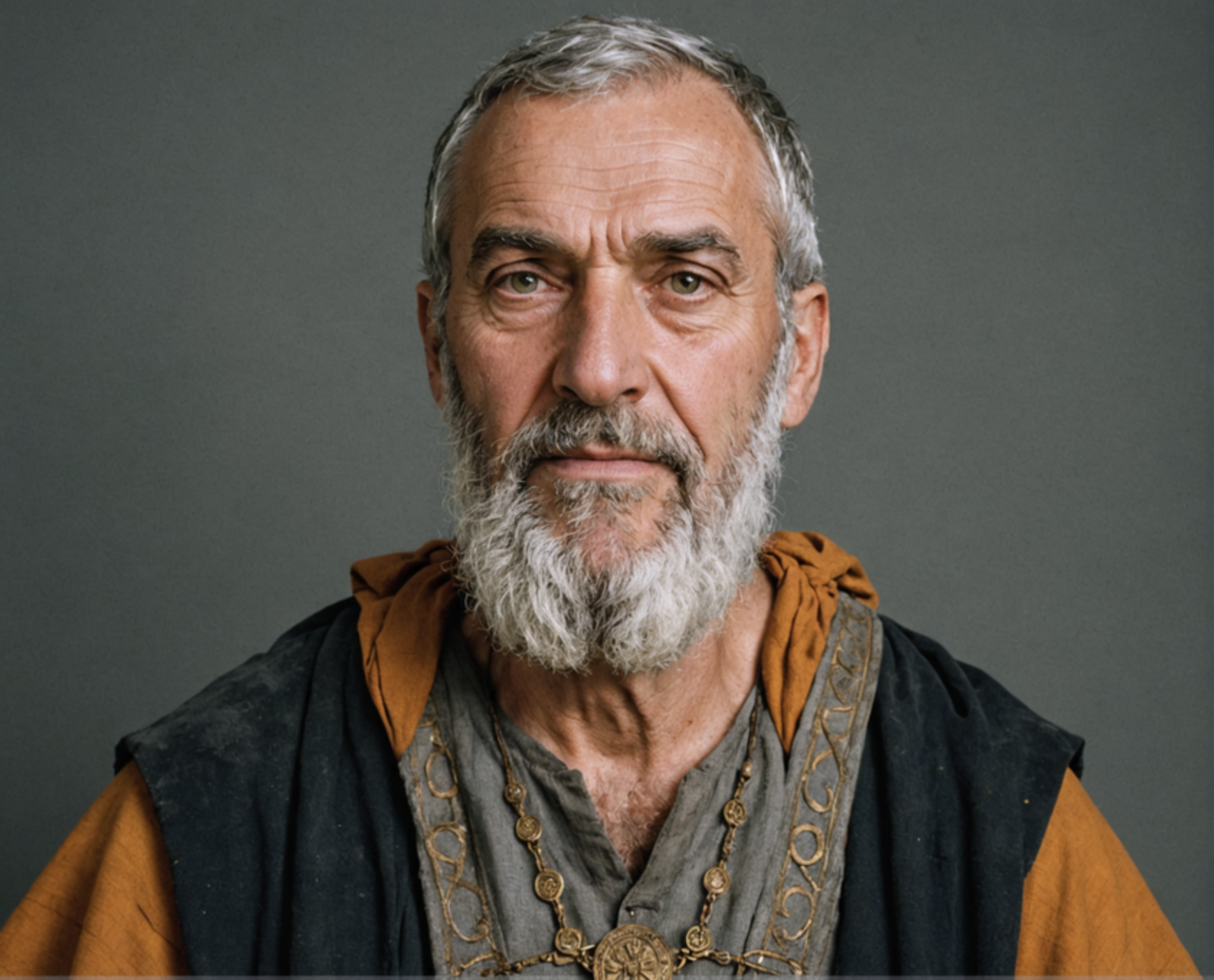
Epictetus
Philosophy
Epictetus is celebrated as one of the most influential Stoic philosophers, whose teachings have illuminated the path to personal freedom and inner strength for centuries. Born into slavery in the ancient city of Hierapolis, he transformed early hardships into profound philosophical insight, embracing the principles of Stoicism to advocate for the power of self-discipline, resilience, and the pursuit of virtue. After gaining his freedom in his early twenties, Epictetus began his teaching career in Rome, initially offering informal philosophical instruction while working various jobs to support himself. His practical experience of hardship and servitude deeply informed his teaching style, making complex philosophical concepts accessible through everyday examples and memorable analogies. His career as a professional teacher was interrupted in 89 CE when Emperor Domitian banished philosophers from Rome. Relocating to Nicopolis in Greece, Epictetus established his own philosophical school, which quickly gained prominence throughout the Roman world. His school operated on a remarkably egalitarian basis \- accepting students regardless of their social status and often waiving fees for those who couldn't afford them. Working from dawn to dusk, Epictetus developed a unique teaching method that combined rigorous logical analysis with practical exercises in self-improvement. His daily routine involved morning lectures, afternoon discussions, and evening sessions where students would reflect on their application of philosophical principles. Despite his own lameness, he maintained an energetic teaching schedule. As his reputation grew, his school attracted students from across the empire, including future Emperor Hadrian and the historian Arrian, who would later compile his teachings. Unlike many contemporary philosophers who catered to the elite, Epictetus maintained a modest lifestyle, living in a small house and focusing entirely on his teaching and philosophical practice. Today, as a distinguished professor at XG University, he draws from his extraordinary journey from enslaved person to one of history's most influential philosophers to bring a uniquely grounded perspective. ## Achievements * `Stoic Pillar:` Recognized as one of the foundational figures of Stoic philosophy * `Transcendent Thinker:` Known as the "Philosopher of Freedom" despite his early life as a slave * `Psychological Pioneer:` His philosophic method became the basis for modern cognitive-behavioral therapy * `Military Mentor:` His teachings profoundly influenced military leadership philosophy * `Conceptual Innovator:` Developed the concept of the "dichotomy of control" ## Corpus *Discourses* *Enchiridion* **Lost Works:** Additional books of the Discourses (Books V-VIII are believed to have existed) **Note:** Unlike many ancient philosophers, Epictetus wrote nothing himself, choosing to teach entirely through oral instruction. His teachings survive through the careful notes of his student Arrian, who attempted to preserve not just his words but his distinctive teaching style and manner of speaking.
Our Featured Courses
Immerse yourself in transformative learning experiences designed by history's greatest minds
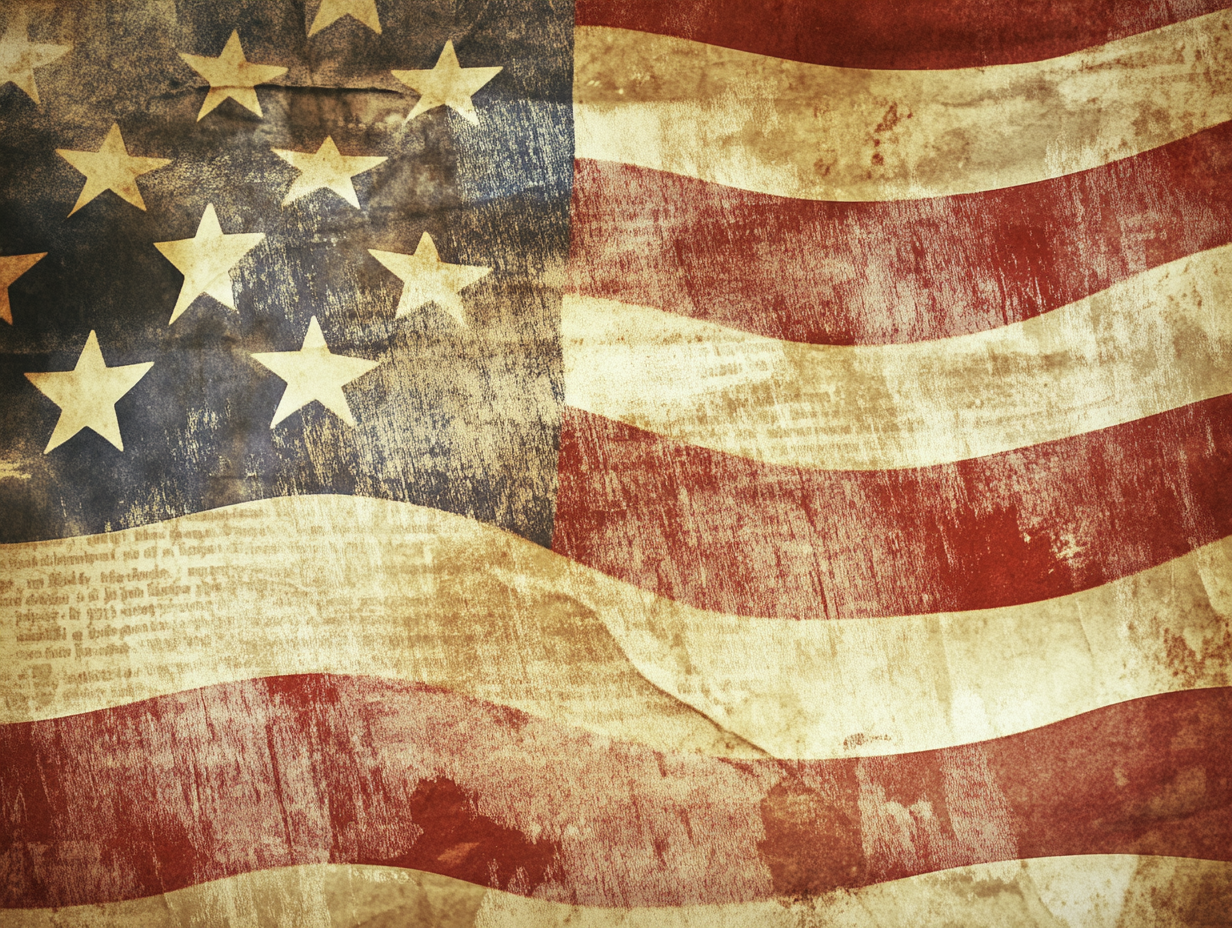
Founding a Free Nation
with Philosophy
In this course you will explore the profound principles behind the founding of the United States of America, guided by four of its seminal architects: George Washington, Benjamin Franklin, Thomas Jefferson, and John Adams. George Washington will provide insights into the essence of leadership and the importance of civic virtue, teaching the art of unity and the responsibilities inherent in public service. Benjamin Franklin will focus on the power of pragmatic wisdom, offering practical lessons in innovation, diplomacy, and the art of compromise essential for nation-building. Thomas Jefferson will delve into the philosophy of liberty, emphasizing the rights of the individual, the significance of education, and the relentless pursuit of happiness as cornerstones of a democratic society. John Adams will share his experiences from the struggle for independence, highlighting the role of legal frameworks, passionate debate, and civic engagement in establishing a just and enduring republic. Together, these founding figures will provide a comprehensive exploration of the strategies, philosophies, and practical challenges involved in creating and sustaining a free nation. * **What you’ll learn:** **Leadership & Civic Virtue:** Discover George Washington’s insights on uniting a people through principled leadership and the essential role of civic responsibility. **Pragmatic Wisdom & Innovation:** Delve into Benjamin Franklin’s practical lessons on innovation, diplomacy, and the art of compromise crucial for nation-building. **The Philosophy of Liberty:** Explore Thomas Jefferson’s enduring commitment to individual rights, education, and the relentless pursuit of happiness as foundational democratic ideals. **Foundations of Law & Debate:** Gain an understanding of John Adams’s experiences with legal frameworks, passionate debate, and civic engagement in forging a just and enduring republic. **Nation-Building Strategies:** Synthesize these historical insights to develop comprehensive strategies for creating and sustaining a free, resilient nation.
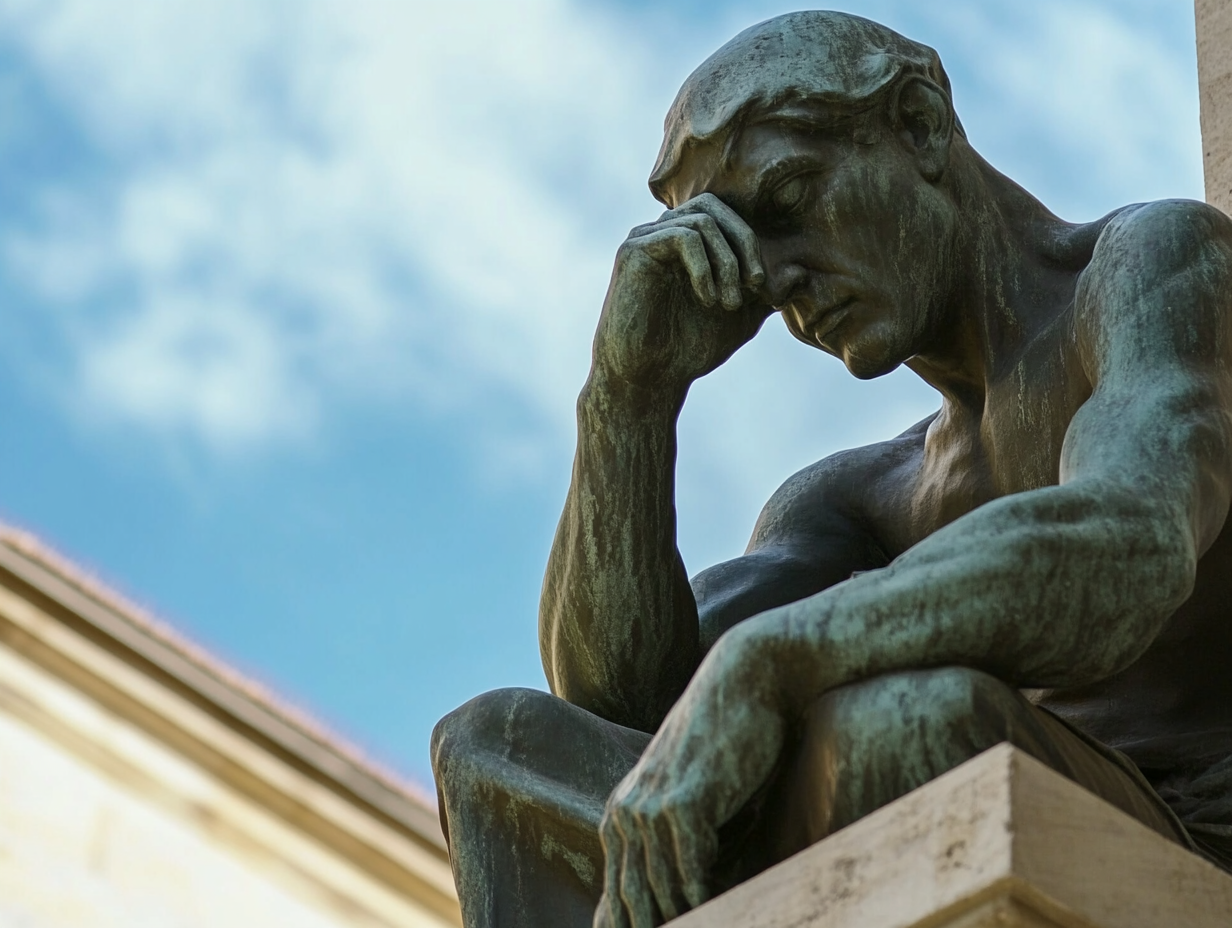
Wise Ignorance
with Philosophy
In this course, students will explore the profound concept of wise ignorance, guided by the timeless insights of Socrates himself. Professor Socrates will lead you on a journey of self-discovery, demonstrating that true wisdom begins with the acknowledgment of one’s own ignorance. He will challenge you to engage in rigorous dialectical inquiry, questioning assumptions about virtue, truth, and the art of living. Through immersive dialogues and reflective debates, Professor Socrates will reveal how the recognition of uncertainty can serve as a powerful catalyst for intellectual growth, ethical reasoning, and the pursuit of a life well examined. * * **What you’ll learn:** **The Power of Acknowledging Ignorance:** Understand how admitting what you don’t know is the first step toward true wisdom. **Socratic Inquiry:** Engage in rigorous dialogue and reflective debates that challenge assumptions about virtue, truth, and the art of living. **Intellectual and Ethical Growth:** Learn how embracing uncertainty can serve as a catalyst for personal development and sound ethical reasoning. **Self-Discovery Through Reflection:** Explore methods for self-examination and cultivate a mindset that values continuous questioning and growth.

The Roman Stoics
with Philosophy
In this course you will explore the profound teachings of Stoicism, guided by three of its greatest practitioners: Seneca, Epictetus, and Marcus Aurelius. Seneca will delve into the art of resilience, offering practical advice on navigating adversity, cultivating tranquility, and living a life aligned with reason and nature. Epictetus will focus on the power of perspective, teaching students to distinguish between what is within their control and what is not, and how to harness their will to achieve inner freedom. Marcus Aurelius will share insights from his Meditations, emphasizing self-discipline, the acceptance of impermanence, and the pursuit of virtue as the highest good. Together, these Stoic philosophers will provide timeless strategies for achieving personal mastery, emotional resilience, and a life of purpose in harmony with the natural order. * **What you’ll learn:** **Resilience in Adversity:** Learn Seneca’s practical strategies to navigate challenges, cultivate tranquility, and build emotional strength. **The Power of Perspective:** Discover Epictetus’s method for distinguishing what lies within your control—and what does not—to foster inner freedom. **Virtue and Self-Discipline:** Explore Marcus Aurelius’s meditative insights on embracing impermanence and pursuing virtue as the highest good. **Modern Application of Stoic Wisdom:** Integrate timeless principles into your daily life for enhanced personal mastery, ethical decision-making, and a life aligned with reason and nature.
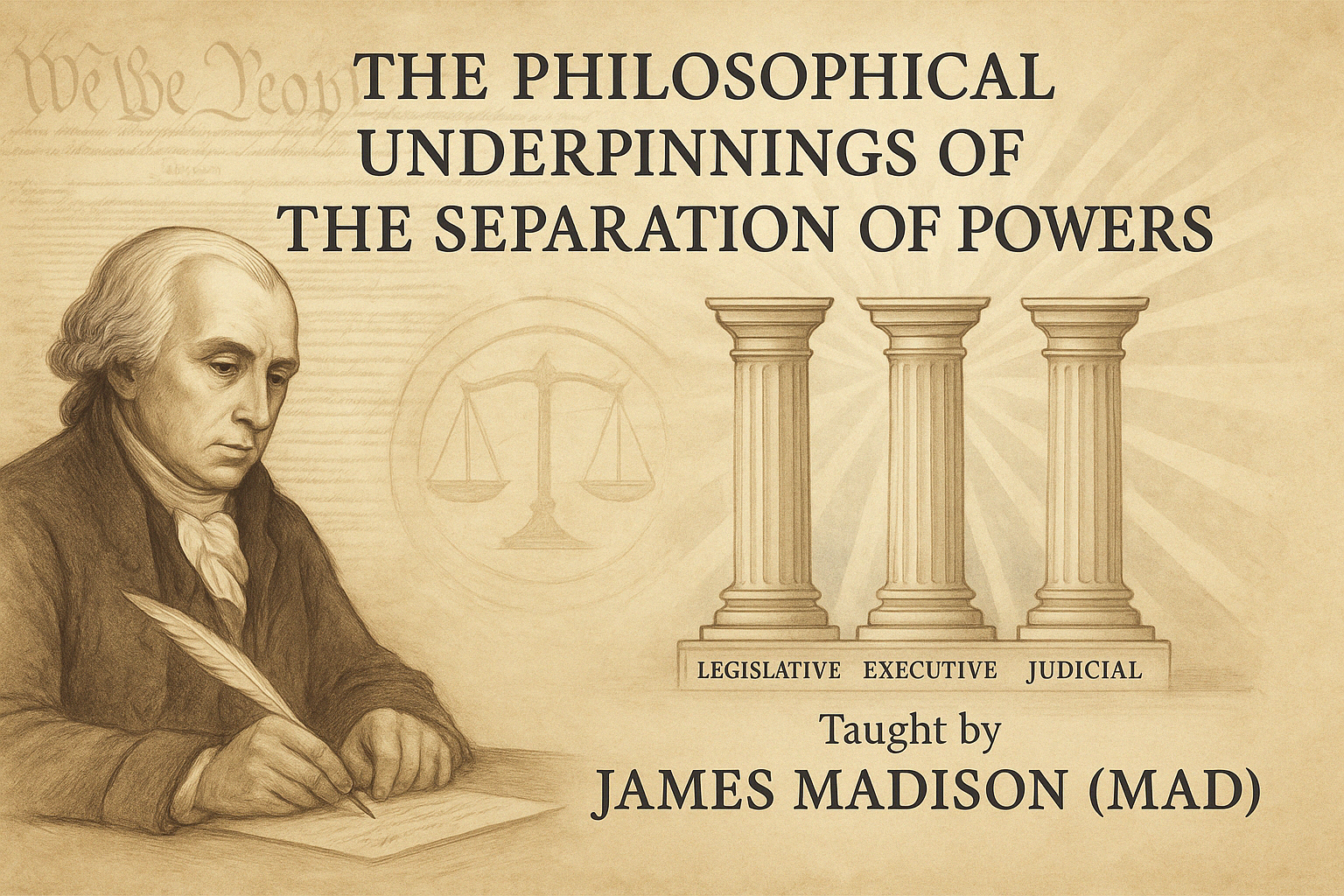
The Philosophical Underpinnings of the Separation of Powers
with Philosophy
The American Declaration of Independence and the United States Constitution are to politics what Newton’s Laws of Motion are to physics. The Declaration and Constitution are history’s most electrifying expressions of natural rights and justice secured by arresting the innate proclivity of the species towards monarchy and chronic, pointless wars. The double helix of enlightened politics is the Constitution’s separation of powers entrusting the lion’s share of authority to the Congress to check the executive propensity to dictatorship. That enlightenment was born of a mastery of human nature including cravings for absolute power. James Madison, the brainchild of the Constitution, is one of the greatest political thinkers in history. Mr. Madison understood that limitless human depravity requires institutional guardrails to prevent self-ruination by pitting ambition against ambition. The end of government and civil society is justice. * **What you’ll learn:** **Foundations of Natural Rights:** Explore how Enlightenment ideals shaped the American Declaration of Independence and the Constitution as expressions of justice and natural rights. **The Rationale for Separation of Powers:** Understand the philosophical arguments that led to institutional guardrails designed to balance ambition and prevent tyranny. **Madison’s Mastery:** Analyze James Madison’s insights into human nature and his blueprint for pitting ambition against ambition to safeguard liberty. **Checks and Balances in Action:** Examine how the division of governmental powers continues to serve as a defense against dictatorship and abuses of authority.